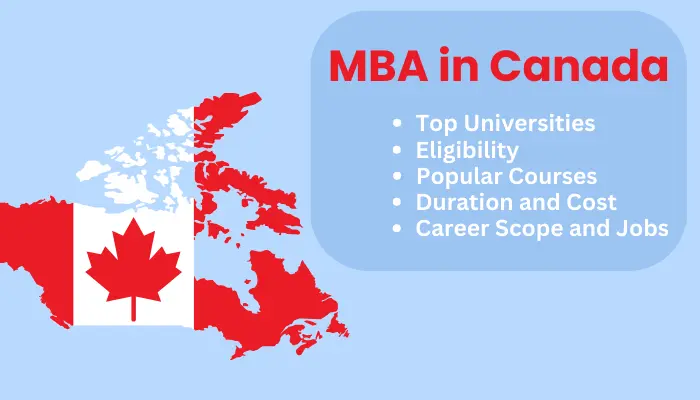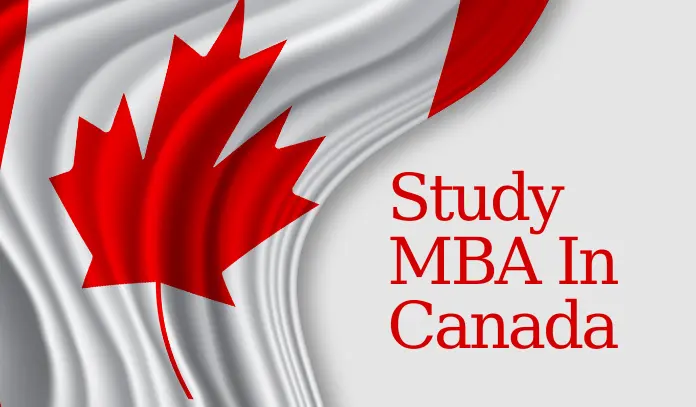Study in Canada has become a top choice for ambitious professionals looking to advance their careers through advanced business studies. Renowned for its high-quality education, diverse cultural landscape, and thriving economy, Canada offers a compelling environment that transcends geographical boundaries. In this comprehensive exploration, we delve into the multifaceted aspects of pursuing a Master of Business Administration (MBA) in Canada, covering program types, eligibility criteria, costs, top institutions, career prospects, and the invaluable post-graduation experiences.
Diverse MBA Programs in Canada:
- Program Variety: Canada offers a wide array of MBA programs, including full-time, part-time, executive, and joint-degree options, providing flexibility to cater to diverse career aspirations.
- Rich Specializations: The richness of specializations, spanning finance, marketing, and technology management, allows students to tailor their MBA experience to align with their unique professional goals.
- Global Perspective: Programs in Canada often incorporate a global perspective, reflecting the country’s multicultural landscape and preparing students for an international business environment.

Top MBA Colleges in Canada:
Canada is home to several globally acclaimed institutions that consistently rank among the best. The Rotman School of Management at the University of Toronto, the Ivey Business School at Western University, and the Sauder School of Business at the University of British Columbia are just a few examples. These institutions are distinguished by their accomplished faculty, innovative teaching methodologies, and robust connections to the business community.
List of Top Canadian Institutions for MBA
- Rotman School of Management
- University of Toronto
- Ivey Business School
- Western University
- Sauder School of Business
- University of British Columbia
- Schulich School of Business
- York University
- Desautels Faculty of Management
- McGill University
- Smith School of Business
- Queen’s University
- HEC Montréal
- Université de Montréal
- Telfer School of Management
- University of Ottawa
- Alberta School of Business
- University of Alberta
- John Molson School of Business
- Concordia University
Eligibility Criteria and Admission Requirements:
- Educational Prerequisites: Typically, applicants are required to hold a bachelor’s degree from a recognized institution, demonstrating a solid academic foundation.
- Relevant Work Experience: MBA programs often seek candidates with relevant work experience, usually ranging from 2 to 5 years, contributing to a diverse and experienced cohort.
- Standardized Testing: Admission may require standardized test scores, such as the GMAT or GRE, evaluating applicants’ aptitude for advanced business studies.
- Language Proficiency: Proficiency in English, assessed through tests like TOEFL or IELTS, is essential to ensure students can fully engage with the program’s curriculum.
Cost Considerations for MBA Studies:
While the tuition fees for MBA programs in Canada vary, they typically range from CAD 30,000 to CAD 60,000 per year. In addition to tuition, students need to account for supplementary costs, including textbooks, materials, and sometimes mandatory health insurance. Considering the broader financial picture, prospective students must also factor in living expenses, averaging around CAD 10,000 to CAD 15,000 per year. Exploring available scholarships and financial aid options becomes imperative in navigating the financial aspect of pursuing an MBA.
Navigating the Cost of Living in Canada:
Canada, with its high standard of living, presents diverse cost-of-living scenarios based on the city of residence. Larger cities like Toronto and Vancouver may incur higher living expenses compared to smaller towns. Effective budgeting encompassing accommodation, food, transportation, and miscellaneous expenses is key to managing the cost of living. Exploring affordable housing options and local resources further contributes to a more sustainable financial plan.
Also Read: Applying for an MBA Abroad: Guide to Eligibility, Costs, and Cost-Reduction Strategies
Top Canadian Institutions Fostering Excellence:
Beyond the aforementioned institutions, Canada hosts other distinguished business schools, including the Schulich School of Business at York University and the Desautels Faculty of Management at McGill University. These institutions are recognized for fostering innovation, offering a global perspective, and providing students with a robust foundation for leadership roles in the dynamic world of business.
Unlocking Career Opportunities Post-MBA:
- Diverse Career Paths: Completing an MBA in Canada opens doors to diverse career paths, with graduates well-prepared for roles in finance, consulting, technology, and healthcare.
- Practical Skills: The emphasis on practical skills and real-world applications ensures that graduates possess the hands-on experience necessary to excel in their chosen fields.
- Networking Opportunities: Networking events, career fairs, and collaborations with local industries provide invaluable opportunities for graduates to connect with professionals and prospective employers.
- Global Exposure: The global exposure gained during the MBA program equips graduates with a broader perspective, making them assets in an increasingly interconnected and globalized business landscape.
Navigating Post-MBA Salaries:
Post-MBA salaries in Canada reflect the dynamic nature of the job market and the individual’s chosen industry. While averages can provide a ballpark figure, actual salaries vary based on factors such as industry, location, and an individual’s prior experience. Sectors like finance, consulting, and healthcare are particularly known for offering lucrative opportunities for MBA graduates.
Post-Graduation Work Permit Opportunities:
One of the unique advantages of completing an MBA in Canada is the eligibility for a post-graduation work permit (PGWP). This permit allows international students to work in Canada for a duration equivalent to the length of their program, up to a maximum of three years. The PGWP serves as a bridge between academic excellence and practical experience, enabling graduates to contribute meaningfully to the Canadian job market.
In conclusion, pursuing an MBA in Canada is a transformative journey that goes beyond academic excellence. It represents an investment in one’s professional and personal growth, providing a gateway to global opportunities. As Canada continues to stand as a beacon of economic strength and cultural diversity, an MBA from this vibrant nation positions graduates to thrive in the ever-evolving landscape of international business. The invaluable experiences gained during the MBA journey, coupled with the prestige of a Canadian degree, make this educational endeavor a truly enriching and life-changing pursuit.





